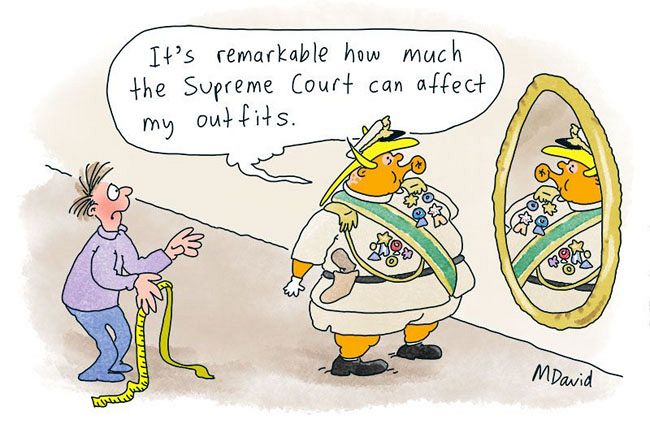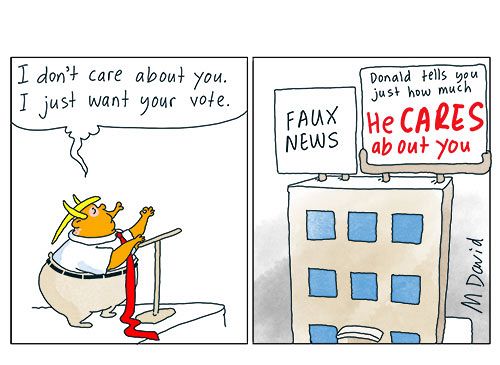Under Trump's Presidency, the Republican Party turned into a cult-like herd largely ceasing to perform the role of a political party.
George Grundy continues his series on the collapse of American democracy in the lead-up to the 2024 Election. Read the first part here, part two here, part four here, part five here, part six here, part seven here and part eight here.
DONALD TRUMP’s efforts to attack, delay and dodge the legal system are just a part of his years-long effort to delegitimise the judiciary (a co-equal branch of American governance afforded equal power under the Constitution as Congress and the Presidency).
From his younger days associating with the mephistophelian Roy Cohn, Trump has used the courts as his plaything, denouncing any action against him as unfairly motivated and suing those with fewer resources in order to force submission.
This contempt for the law has been apparent from the start of Trump’s political career when he claimed that he could not get a fair hearing due to a judge’s Mexican heritage. Trump has been a prime mover in the Republican Party’s assault on judicial integrity and nowhere has the degradation of the instruments of state been more starkly illustrated than the collapse of confidence in the Supreme Court.
Donald Trump employs scorched earth tactics when faced with legal obstacles, attacking judges, jurors, prosecutors, clerks — anyone, including family members, breaching gag orders with apparent impunity. Republican politicians currying favour with the ex-President have failed to disavow Trump’s outrageous behaviour and many appeared at Trump’s recent hush-money trial to denounce the jury’s verdict as politically motivated.
When Trump’s “total immunity” claim went before the Supreme Court, many of his political allies were overt in voicing their expectation that the justices Trump appointed would, naturally, rule in his favour. It is very hard not to conclude that the Supreme Court took Trump’s appeal solely to delay his Washington trial and if that’s true, then yet another of America’s great institutions is now fatally corrupted and under Trump’s control.
With the nation’s highest court in his pocket and ideological judges delaying criminal cases against him, Trump has been broadly successful in turning significant elements of the judiciary into another arm of the Republican Party.
This disdain for judicial independence can equally be applied to those who break the law on Trump’s behalf. Trump has recently started referring to those convicted of crimes on 6 January as “hostages”, describing them as “unbelievable patriots”. He regularly commences his fascistic rallies by saluting an altered version of The Star Spangled Banner sung by a choir of those same 6 January insurrectionists, uncomfortably aping the Nazis of the 1930s.
Trump has said that members of Congress who served on the 6 January Committee should be gaoled and has promised that (if elected) one of his first acts will be to free those convicted of crimes that day. This is a common tactic by the former President, re-framing events we saw with our own eyes and using the media and constant repetition to lie to his cult-like followers, until he feels able to describe 6 January as a “beautiful day” and the crowd as having been “filled with love”.
More broadly, offering to pardon 6 January rioters gives tacit permission to others to commit violent acts on Trump’s behalf in the future.
Of the defendants charged with participating in the 6 January insurrection, 210 have claimed that they thought they were acting on Trump’s instructions when they attacked the Capitol. Fifty-three Republican officials, lawyers and activists have been charged with felony crimes centred around Trump’s 2020 effort to retain power.
Trump’s corruption of elements within the judiciary and his efforts to delegitimise any use of the law against him has resulted in an entire political party now casting doubt on any legal machination that isn’t in its favour. Trump is attempting to break the rule of law in America and should he take office again, it’s likely that the nation’s once-famed independent judiciary will collapse under the onslaught.
Republicanism — becoming a majority-minority party
How a mature political organisation like the American Republican Party has found itself mired in a personality cult and led by a twice-impeached rapist felon is worth considering, as the answers can inform our perception of the months ahead.
Republicanism has for some time been caught in a vice. Younger Americans are, broadly, more liberal than older generations (in fact, young people were the most enthusiastic age group when it came to voting for the oldest President in history — Joe Biden) and the racial diversification of American demography means that the Party’s “pale, male and frail” base is dying. Every election cycle, it becomes more and more difficult for Republicans to compete fairly and win.
Faced with such an existential challenge, one option might be for Republican politicians to broaden their appeal. But from a more cynical perspective, this electoral time bomb means that the Party is forced to do everything possible to seize power and never relinquish it.
This thinking is central to the position Donald Trump has adopted in public life — that a certain percentage of Americans believe that the “real America” is disappearing and that the only way their voice can now be heard is in a post-politics world, where civil discourse and argument is replaced by strong-man authoritarianism.
Republicans have won the popular vote just once in the last eight presidential elections, yet because voter suppression measures, gerrymandering and the Electoral College often provide disproportionately successful outcomes, the Party has failed to reform. Rather than engage in a marketplace of ideas, Republicans often try to stay in power by putting their fingers on the scale. As a result, the Party continues to be able to champion political ideas that are often wildly out of step with American opinions.
Take the gutting of Roe v Wade, an incredibly unpopular decision that should be electoral cyanide. Abortion rights are overwhelmingly supported across the United States, and several elections in which the 2022 Dobbs decision (which allowed states to ban abortion) was a prominent issue have been resoundingly lost by Republicans.
One in three American women now live in states where abortion is banned or severely restricted. Unsurprisingly, states with the most restrictive abortion rights also have the highest rates of other social ills like maternal and infant mortality.
In 2022, Ohio’s “fetal heartbeat” law meant that a 10-year-old rape victim was not able to terminate her pregnancy. In South Carolina, Republicans have proposed a bill that would subject women who have abortions to the death penalty (so “pro-life” that they’re pro-death). Many Americans recoil in horror at this level of ideological extremism, yet the Republican Party and their White nationalist supporters seem incapable of pulling back.
Even Trump has moderated his public stance, having previously said that women should be “punished” for having abortions, but if he gains the Presidency once more, it’s likely that America’s stampede towards a whole raft of sexuality and sexual health restrictions will quickly gather pace.
Banning abortion is just one of many goals. Contraception, mixed-race and same-sex marriage, fertility treatment — all of these are now firmly in conservative sights. American women, especially those of reproductive age, will find their bodily freedom under severe attack during a second term in office for Donald Trump.
The Republican platform is filled with these sorts of proposals that run counter to public sentiment, such as cutting social security or expanding the already lax gun laws that regularly cause mass shootings and mayhem. Incredibly, Republicans are now calling for a ban on universal free school lunches. Who tries to win office by stealing kids' lunches?
These are political ideas that are overwhelmingly rejected by the American public, but if Republicans refuse to moderate their opinions, their only way to attaining power is to use precisely the sort of tools we see manipulated every day — voter suppression, gerrymandering, culture war distractions and misinformation.
Extremist political positions like these are rare among mainstream parties in mature democracies, for obvious reasons. Politics need not be a popularity contest, but when one party consistently takes positions that are wildly unpopular, it’s worth considering why.
America’s Electoral College system means that in a divided nation, most elections come down to just a small number of “battleground” states that are actually in play. From a nihilistic perspective, this means that a Republican presidential candidate can entirely disregard the views of the 39 million residents of California – a state that always votes blue – and equally take no notice of voters in states like Wyoming or West Virginia, which are reliably deep red.
So from a cynical point of view, all that matters is persuading a relatively small section of voters from a small number of states like Michigan and Georgia, and where once the goal was to persuade voters with ideas and policies, success can equally be achieved by depressing the vote or emphasising so-called “culture war” issues that encourage voters to cast their ballot on a single issue like immigration at the border (2024’s culture war focus du jour).
But perhaps this is all irrelevant, given the political divide now splitting America. Modern Republicanism has become more of a cult-like movement than a political party. In the last two elections, Republicans haven’t even published a party platform. They think that voters don’t really care what their actual policies are anymore. Trumpism is an anti-politics movement, a cultish grievance machine with little interest in legislation or governance.
The current Congress is the least productive in over half a century, preferring internecine squabbling, boycotts on Bud Light beer and performative rabble-rousing in the hope of gaining favour with the former President.
Actual legislating is not required or often actively eschewed. House Republicans recently voted against a border bill they themselves had asked for, when it became apparent that Trump was unhappy with it. Republicanism is largely ceasing to perform the traditional role of a political party. As has often been said, it’s a cult.
This article to be continued next Friday, 19 June.
Read part one of ‘America's gathering storm’ here, part two here, part four here, part five here, part six here, part seven here and part eight here.
George Grundy is an English-Australian author, media professional and businessman. You can follow him on Twitter @georgewgrundy.
Related Articles
- Life expectancy data reaffirms the horrors of a Trump Presidency
- America's gathering storm: Trump stacks Supreme Court to get away with murder
- CARTOONS: U.S. Presidential Debate in a nut-ter's shell
- America's gathering storm: The danger of a second Trump presidency
- CARTOONS: Hush money speaks loud... then drops the mic in Trump's trial
 This work is licensed under a Creative Commons Attribution-NonCommercial-NoDerivs 3.0 Australia License
This work is licensed under a Creative Commons Attribution-NonCommercial-NoDerivs 3.0 Australia License
Support independent journalism Subscribe to IA.
















